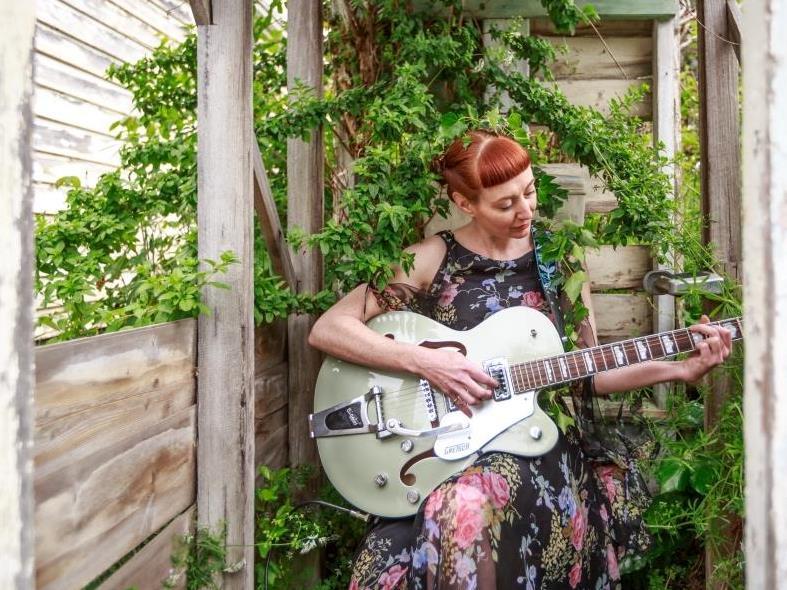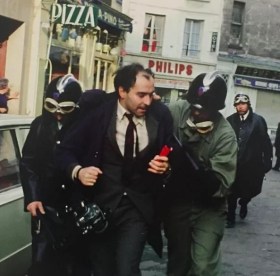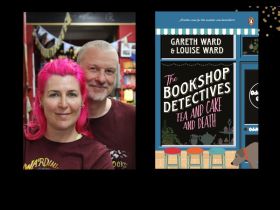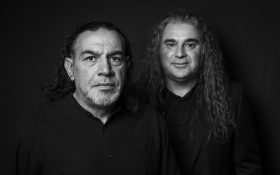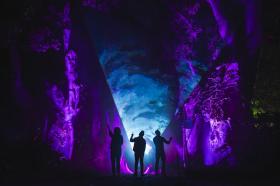Heather Marsh has found meditation challenging but rewarding. Image credit: Aldona Kmiec
For many creatives, especially those who experience anxiety and the inability to focus because of mental clutter, the practice of meditation is a welcome relief.
‘Meditation creates a beautiful flowing mental environment for new ideas and potential innovation to happen,’ said David Jones, a professional percussionist who teaches meditation to beginner and intermediate students at the Brahma Kumaris Meditation centre in Fitzroy.
‘When the mind is too fragmented, busy and messy, there’s not the space for newness and connectivity to arise,’ he said.
Beginning his meditation practice in 1984, Jones said the benefits have had a profound effect on his musical career and life in general.
‘Stillness and silence before playing and before speaking (in fact before any activity), sets the intention and creates an atmosphere of connection and gentle focus,’ he explained.
‘It brings me into the present moment and awareness that this moment is precious and full of potential. This is a perfect setup of intention and of an optimum relaxed state; I feel it’s the zone we need for the flow of creativity and inspiration.’
And for those that find meditation difficult or worry that they’re doing it wrong, Jones said this:
‘Firstly, even the notion of success needs to be re-addressed. Success in meditation is incremental; it’s something to build on and gradually increase.
‘If I sit for five minutes and start to observe my thoughts and think along a certain line of peaceful thinking and I have a moment of calm, then this is success!’
Here’s how meditation has helped the following artists in their creative practice.
Cam Venn – Performer: ‘Visualisation’
‘I’ve been meditating for five years now. The main one I use is called Creative Release by an Aussie guy called Ken Mellor. I have found meditation tremendously effective to create what I want in my life.
‘Before I embark on a season I go into a visualisation where I imagine myself at the end of it all and that it went amazingly.
‘Sometimes I put on epic inspirational music (like I literally put that in a search on Youtube) then I listen and play an epic cinematic montage in my head of what I want to create. A theatre packed to the brim with laughing people … or the peace I feel at the end of a successful season. I go into it so fully that I feel it as if it is real and I laugh and cry with real joy as if it’s really happening.
‘All the success I’ve had, at some point was just a creative visualisation and a focused meditation. Meditating allowed my body and mind to be still and shift negative thought patterns and replace them with gratitude for the life to come.’

Meditation is crucial for success says performer Cam Venn. Photo by Richie Hallal and Cam Venn for Charles Horse Lays an Egg.
Alex O’Sullivan – Writer: ‘Patience’
‘I started meditating back in 2015 when my psychologist suggested a “Mindfulness” course to combat my anxiety due to a past abusive relationship. Since then I’ve tried my best to keep it up, at least a few times a week, or more if I feel particularly anxious, blocked or depressed.
‘The main thing that meditating does for my creativity is it focuses my mind. It stops my brain from wanting to rush about from idea to idea, so that I can sit at my laptop with a piece of writing – just sit with the writing in the same way you practice sitting with one sensation – such as breath – during a meditation session. I’ve found a greater level of patience with my work due to meditation.’
Rachel Smith – Writer, Founder Rachel’s List: ‘Concentration’
‘I think meditation helps enormously with creativity in the sense that it calms the mind and enables greater focus. The more you do it, the more you are able to focus, which can be incredibly difficult when we’re assailed by social media, email pinging into the inbox, the phone ringing, texts coming through, etc.
‘We live in a constant state of distraction. And I think it can be habitual to tune into those distractions without thinking because you are giving yourself “breaks”. When you meditate, I find that changes. I find I can become much more single-minded about writing, I can write for much longer, and I am not so distracted by external things. I don’t need as many breaks from my work / writing and I also don’t seem to suffer the same kind of mental exhaustion.’
Heather Marsh – Multidisciplinary artist: ‘Attachment’
‘I have only been meditating for a short time. My focus in meditation has been to allow myself to just be – not be constantly thinking about producing work or achieving. I meditate for between ten and fifteen minutes a night before bed.
‘The biggest change to my creative practice has been allowing myself to make art without having to have a major project in mind. I’ve been finding micro-creativities like picking up my guitar just for the pleasure of playing rather than working towards a creative goal. That has ironically led to making new work but it’s lovely to be allowed to just be creative without it having to have a public outcome.
‘I knew meditation could be helpful but was resistant for years. It is challenging but not in the ways I thought. I was worried I would be bored! Now I know that the biggest challenge will be accepting my own mind and thoughts.’

Image Tim Goedhart via Unsplash.
Jo Neary – Comedian and Actor: ‘Clarity/Prioritisation’
‘I’ve been meditating just over a year. I took a course last year to help me get a clearer head, I was feeling overwhelmed by things and getting really forgetful. It was great for ages but then I started to forget to do it.
‘I do Transcendental Meditation, it’s really very lovely. You do feel like you’re diving down inside yourself and becoming at one with the sparrows. The first time I did it, I felt like I’d been hit over the head by a sledge hammer of relaxation, which is probably what Maharishi was going for.
‘When I meditate, I don’t get loads of ideas or anything, but I do think that afterwards, meditating brings clarity to my practice and a stronger sense of myself. It helps me prioritise, to give things in life the right amount of attention and concern, and to let other things go away. I’d really recommend TM to creative people and if you’d like to read more I’d recommend David Lynch’s book Catching a Big Fish, it’s all about catching creative ideas and meditation.’
Sonia Gellert – Writer: ‘Focus’
‘I’ve been meditating regularly (three times a week, or so) for around fours years – before this time I meditated far less frequently and for the past 2 years, I’ve meditated nearly every day.
‘As an anxious person, I find meditation helps me to re-channel my anxious energy into a creative fuel for writing.
‘By meditating in the morning, I’m able to calm my mind to a more focused pace. I can better identify the thoughts and emotions that can distract my practice, and am able to re-focus and clear away those disruptions more effectively. With a clearer, less frantic, mind, I have more space for ideas and creativity.’
Elizabeth Davie – Performer: ‘Accessibility’
‘I tried meditation on and off over the past five years, but it wasn’t until earlier this year that I properly incorporated it into my performance practice. I now meditate before every performance, whether it’s an hour-long show or a five-minute stand up spot.
‘I also meditate when I’m generally feeling stressed or anxious. I’ve found it hugely helpful for performing. It definitely reduces my nerves and calms me down before a gig, but I also think it makes me a better performer. After meditating, I find it easier to access the joy of performing and to be open and vulnerable with the audience.’
